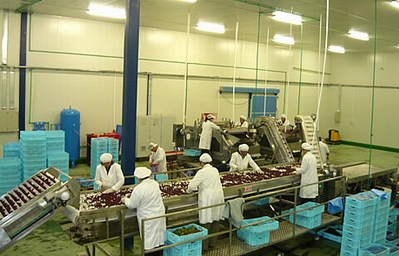SonderJansen is an international importer, exporter and producer of frozen fruits and vegetables. The sales of IQF (Individually Quick Frozen) frozen fruit and vegetables, which are mostly processed at own production locations in Poland and Servia, are regulated from the main office in Oss, The Netherlands. The company operates in the higher segment of the market and tries to define itself in its quality management. "We don't wait for a customer to ask for a pesticide residue analysis, we play an active role. This provides us with chances. Quality people also have an increasingly decisive voice among buyers," says commercial manager Hans Brittijn.
Trade more just in time
Hans takes care of sales and purchases together with owner Gerrit Sonder. He says the trade has changed a lot in recent years. "Buyers used to be able to buy ahead when there were low prices, but they no longer have that freedom. We used to have a good idea of the balance between the sales and purchasing contract in September until the new harvest. Because more is being bought just in time, this image has been clouded, but we still end up with the same volume."
SonderJansen was founded in 1996 and a partnership was made with a Bulgarian raspberry supplier in 2001, as an addition to the Chilean season. In 2003 the step was made to open a factory in Poland (VidanSonder) to meet the increasingly strict customer demands. Their own factory turned out to be right on target and the processing location followed in 2008, right in the middle of Southern Serbia (SonderDux). "We started out during the crisis, but this meant that we were ahead of the competition," says Hans. "It is still a big challenge to find motivated production employees for the factories."
Trade more just in time
Hans takes care of sales and purchases together with owner Gerrit Sonder. He says the trade has changed a lot in recent years. "Buyers used to be able to buy ahead when there were low prices, but they no longer have that freedom. We used to have a good idea of the balance between the sales and purchasing contract in September until the new harvest. Because more is being bought just in time, this image has been clouded, but we still end up with the same volume."
SonderJansen was founded in 1996 and a partnership was made with a Bulgarian raspberry supplier in 2001, as an addition to the Chilean season. In 2003 the step was made to open a factory in Poland (VidanSonder) to meet the increasingly strict customer demands. Their own factory turned out to be right on target and the processing location followed in 2008, right in the middle of Southern Serbia (SonderDux). "We started out during the crisis, but this meant that we were ahead of the competition," says Hans. "It is still a big challenge to find motivated production employees for the factories."

Purchasing insightful
"The world has become a lot smaller, partially due to the internet," continues Hans. "Our suppliers and customers find each other. This was another reason for starting our own factories. Companies who trade from small attics and who aren't insured against recalls and such make it difficult for us. We have a lot more costs, but in the end it means we can define ourselves. We recently hired someone who is employed full-time in quality management. We only buy from companies that are IFS, BRC or ISO-22000 certified. In the past we bought a lot of product in China, but, despite many offers, we now only have 3 suppliers there, which were audited by our own customers."
Ever since they first started the emphasis has been on red fruit at SonderJansen, with strawberries as their main product. "And this won't change. We stick to what we know. Blueberries, red and black cherries, sour cherries, brambles and raspberries are all important products to use. We also supply rhubarb, leeks, pumpkins and onions. The advantage of this is that we can guarantee our employees in the factory a year of income," says Hans. "And every year is different. This year shows that once again every price has its limits. If a price is too high, no one will buy. It's that simple."
Healthy customer portfolio
Other important production countries for SonderJansen are Poland, Serbia, Bulgaria, Sweden, Chile and China. Holland plays a modest role for red, black and blueberries. "Egypt is a no-go for us, as not every producer respects the food safety aspect," says Hans. "Our rule is that all our buyers are credit insured. This is why we had to say goodbye to the Spanish and Portuguese market due to the crisis. But we never regretted this. It has resulted in a healthy customer portfolio with a lot of customers, who pay within thirty days. We have started to enter other market since then, such as Canada and Australia."
In the last year there has been a lot of demand for the products in SonderJansen's puree line, especially smoothie customers. Other important sales routes are the dairy industry, bakers and jam makers. "We supply large frozen companies in Belgium, Germany and Scandinavia. This sector is demanding more and more. It has become more of a condition that the product is packaged in its final packaging in the land of origin," says Hans. A few years ago the company started supplying organic products, such as berries, strawberries and raspberries. "Due to the recession the organic market has become difficult. The demand isn't increasing. But then, neither is the supply."
Future
Hans looks towards the future with confidence. "We aren't one of the big players on the market, and we don't aim to be, but we do want to be a good partner for our customers and suppliers." Once again this year SonderJansen will participate in Anuga.





